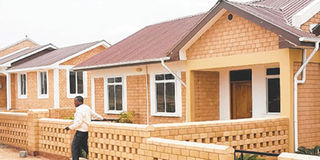Race to end housing deficit hots up

What you need to know:
- Estimates by the National Housing Corporation (NHC) show that Tanzania suffers a housing deficit of some three million units valued at $180 billion. The annual demand for houses in urban areas is estimated at 200,000 units with a projected combined cost of $12 billion.
Dar es Salaam. Various real estate developers are undertaking projects worth over Sh6 trillion, whose completion will help to bridge the gap between demand for, and supply of, decent houses in Tanzania, a new report shows.
Estimates by the National Housing Corporation (NHC) show that Tanzania suffers a housing deficit of some three million units valued at $180 billion. The annual demand for houses in urban areas is estimated at 200,000 units with a projected combined cost of $12 billion.
But, according to the latest Mortgage Market Update by the Bank of Tanzania (BoT), NHC, Watumishi Housing Company (WHC), the National Social Security Fund (NSSF) and private developers are already undertaking housing projects worth over Sh6 trillion in total. The common objective is to develop more houses across the country.
The report – which tracks mortgage financing for the year to December 31, 2017 – outlines NHC’s ongoing projects, including Kawe Satellite City, Kigamboni Mwongozo Housing Estate, Morocco Square and Victoria Place Residence Complex, all in Dar es Salaam.
The Kawe Satellite City project – which is set for completion in 2020 – is being constructed in five phases through a Sh4.9 trillion ($2.2 billion) loan secured from the PTA Bank.
A total of 500 buildings are expected to be developed under the project, hosting about 50,000 residents in an eventful central business district (CBD) initially slated to operate for 20 hours a day nonstop.
Morocco Square’ is another project worth Sh156.8 billion ($70 million) that is also being implemented by the state-owned Housing Corporation. It has two blocks including a shopping mall with a total of 28,827 square metres for different commercial uses, and two office blocks with a total of 47,793 square metres.
Scheduled to be completed by June this year, the Morocco complex will also have residential and hotel towers of 24,924 and 8,456 square metres, respectively.
Furthermore, NHC is constructing the Victoria Place structure at a cost of Sh80.4 billion ($35.9 million) along the new Bagamoyo Road, as well as Mwongozo Housing Estate in Gezaulole, Dar es Salaam, consisting of 216 housing units.
In a related development, 100 title deeds were issued in August 2017 to buyers of plots from the Corporation’s multi-billion shilling project to create a satellite city at Mateves on the southwestern outskirts of Arusha. The project – which involves the construction of houses for low, middle and high-income folk – covers 500 plots on 559.4 hectares.
Additionally – acting in line with the government’s decision to move its functions from Dar es Salaam to Dodoma – NHC introduced a mega-project, the Iyumbu Satellite Centre, for constructing 300 houses worth Sh12 billion in three phases.
For its part, WHC continues with the implementation of the Public Servants Housing Scheme, whereby 50,000 “affordable housing units” are projected to be constructed in five phases.
WHC is currently constructing 590 houses in the Morogoro, Mwanza and Dar es Salaam regions. It also embarked on Watumishi Njedengwe Housing Estate building project in Dodoma for 500 units.
Again, WHC is creating a satellite city of 1,000 modern housing units in Kibaha, Coast Region, to serve up to 5,000 residents.
Working in partnership with the Tanzania Education Authority, WHC continues to implement a project to construct 31 houses for secondary school teachers living in remote areas across Tanzania.
However, the company would not disclose the costs of its projects.
For its part, NSSF is undertaking a housing development programme in Kigamboni –Dege Eco Village Satellite City – targeting to erect 7,460 housing units at a total cost of Sh1.22 trillion ($544.5 million).
With regard to private developers, Avic International is continuing with the implementation of its Avic Town project in Kigamboni, establishing 130 units in its first phase.
On the other hand, the state-owned Tanzania Building Agency (TBA) has continued to construct 10,000 affordable housing units for public servants in various administrative regions on the Mainland.
As it is, the agency has set aside Sh6 billion for the construction of 850 housing units in the Bunju B area of the sprawling metropolis. It has also allocated an undisclosed sum for the construction of 100 houses for civil servants in the newly-proclaimed national capital Dodoma.




